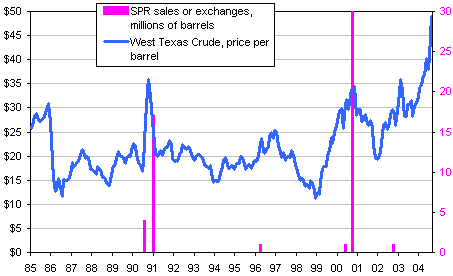Crude is quickly approaching $50 a barrel, leaving no doubt in my mind that oil is in a speculative bubble — very much like what happened to the NASDAQ in 1999 and 2000.
Previoiusly I wrote about some of the forces behind the alarming price rise: increasing global demand, short-term capacity constraints and a big dose of inflation. All of that is real, and it means that oil prices in the future will be generally higher than they’ve been in the past. But none of it justifies oil at $50.
All bubbles have a “story,” a central mythology that’s used to justify paying literally any price. During the tech-stock bubble, the story was the Internet, a revolutionary new technology that would transform commerce and culture. As tech prices rose and rose, the story seemed to be proven correct. Skeptics were converted. By the time the top was reached in March 2000, every man, woman and child in the world was utterly convinced. Of course, at that point there’s no one left to do the buying that keeps prices ascending, because by then everyone has already bought.
The story moving the oil market now is terrorism — the fear that something or other will happen somewhere or other that will disrupt oil supplies in a big way. Say, maybe, tomorrow afternoon the government of Saudi Arabia — a government that probably possesses more super-duper American weapons per capita than any other government in history — will be deposed by dirt-poor Islamic fanatics who’ll turn off the oil spigots (and no one will do anything about it).
Normally you’d file that kind of thing under “Y” for “Yeah, right.” But that’s the kind of story that oil traders are talking about now. And when they see oil prices at $40, then $45 and soon maybe $50, they figure their fantasy must be reality. And if that fantasy really is correct, then why not pay $55? For that matter, why not $100? That’s how bubbles work.
It doesn’t help matters that both political parties are doing their best to terrify everybody about the possibility of another terrorist event. The Democrats want Americans to be scared so they’ll think that George W. Bush has done a bad job in the war on terror. And the Republicans want everybody to be scared so they won’t dare take the risk on a new commander in chief.
There’s something else that the Bush administration is doing that’s feeding the fantasies of fear. Back in November 2001, shortly after the terrorist attacks of September 11, the president ordered the US Strategic Petroleum Reserve filled to near capacity at 700 million barrels. It’s almost there, at 666 million right now.
In the past, oil from the SPR has been sold into the market when prices have gotten way out of whack. In August 1990 and January 1991, around the time of Operation Desert Storm, President George H. W. Bush ordered the sale of 21 million barrels from the SPR. In September and October 2000, President Bill Clinton ordered the exchange of 30 million barrels (that is, a sale with the promise of future repayment in kind from the buyer) in response to the spike in heating-oil prices in the Northeast. In both those cases oil prices fell sharply in response.
CHART
So why isn’t the Bush administration drawing down the SPR to help put a lid on today’s skyrocketing oil prices? We don’t really know. For an administration whose critics say that everything they do is politically motivated, it just could be that they are acting out of pure principle this time. The White House insists the SPR is only for emergencies. But so long as they do nothing, traders in the oil market keep asking, “What do they know that the rest of us don’t know?” And that plays right into the story that’s keeping the bubble afloat.
I think that at some point — perhaps very, very soon — the Bush administration will have a political emergency on its hands as high oil prices start flowing through into shocking price hikes at the gasoline pump. That means that reversing themselves on an SPR drawdown will become a political necessity.
If that happens — or should I say, when that happens — some amazing things could occur. First, we’ll see oil prices drop like a rock, perhaps as much as $10 in a single day. Second, we’ll see George Bush’s poll numbers shoot skyward. Third, we’ll see the stock market rocket back up through the trading range and challenge the highs of the year.
Why? Because ordering a drawdown from the SPR will break the story that’s supporting the oil bubble. It’ll make Bush look presidential — he “did something” about high oil prices. I’ve argued here that the stock market strongly prefers to see Bush re-elected, so the market will rally strongly as Bush’s chances are improved. Of course the market will also rally simply because lower oil prices will be great for the economy. But then again, a great economy makes it even more likely Bush will be re-elected. It’s a virtuous cycle.
What are the odds? I don’t have a crystal ball, but I think it could very easily happen. But it’ll take something special to trigger it, like perhaps a nice, round, scary number like $50 per barrel.
You heard it here first!
The above is an “Ahead of the Curve” column published August 20, 2004 on SmartMoney.com, where Luskin is a Contributing Editor.









